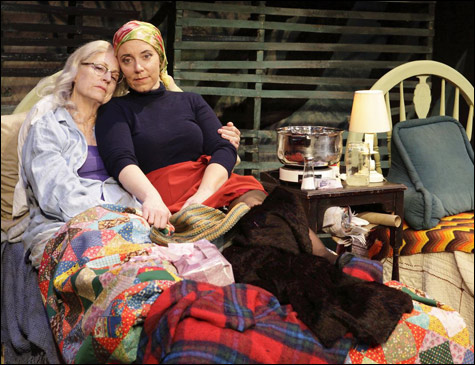
GREY GARDENS: THE MUSICAL The odd valor of Big and Little Edie and the poignancy of their shared dysfunction are enhanced by the score. |
The East Hampton Board of Health would doubtless approve Grey Gardens: The Musical, since it comes minus the crapping cats, feral raccoons, and piles of garbage that form the supporting cast and unsanitary milieu of the famed documentary on which it's based. What the singing version of Grey Gardens, in its local premiere by the Lyric Stage Company of Boston (through June 6), has that David and Albert Maysles's 1975 peep into the lives of fallen American aristocrats Edith Bouvier Beale and her namesake daughter Edie does not is a flashback of a first act that underlines Big and Little Edie's connections to Camelot and a score, part period novelty, part haunting subtext, not borrowed from No, No, Nanette. What Spiro Veloudos's well-pitched production throws in are a couple of pretty uncanny replications of the eccentric, dysfunctional duo the Maysles brothers captured living amid memory, grievance, and squalor. Moreover, Leigh Barrett, who plays Big Edie in act one and the idiosyncratic Little Edie of the documentary in act two, sings better than either.
Composer Scott Frankel came up with the idea of turning Grey Gardens into a musical but at first didn't know how. The documentary, after all, is a plotless meander through a broken-down manse inhabited by a couple of broken-down broads eating cat food while talking like the Astors. The solution Frankel and lyricist Michael Korie hit on was to precede a second act based on the film with a first set 32 years earlier, before the 28-room Grey Gardens and its occupants had fallen into disrepair. And book writer Doug Wright (Pulitzer winner for I Am My Own Wife) ingeniously works not only the seeds of mother and daughter's recriminatory co-dependency but also dialogue lifted from the documentary into this Cole Porter–ish return to less addled, more affluent days.

The appetizer course goes on too long, given that most of the audience is watering at the mouth for the entrée, with Big Edie half-naked in her filthy bed and Little Edie unveiling the "revolutionary costumes" for which towel scarves are fastened with jeweled brooches and skirts are upended and pinned. But the prequel is nicely turned out, the occasion being the run-up to an engagement party that not only incorporates young Bouviers Jackie and Lee but also stretches history to betroth Little Edie (a spry, fetching Aimee Doherty) to Joe Kennedy, elder brother of JFK.
In the course of an East Hampton afternoon, as the narcissistic, bohemian mother conspires with George Gould Strong, the alcoholic accompanist about whom Big Edie rhapsodizes in the documentary, to turn her daughter's fête into a showcase for her own warbling, she's rejected by her starchy Wall Street spouse, her Teddy Roosevelt Republican of a dad, and even Gould, who in the poignant duet "Drift Away" intimates that his days as a kept piano player are at an end. Big Edie does manage to scare off Kennedy with a tale of scandal, and Little Edie announces more than once that she must get away from Grey Gardens and her symbiotic, parasitic connection to mom. The more things change, the more they stay the same.
In the second act, well, you know what happens in the second act — sans cats. As we stand in for the Maysles brothers, mother and daughter indulge in affected reminiscence of bygone days and rued decisions and bicker and talk over each other, and Big Edie boils corn on a hot plate to share with teenage stoner neighbor Jerry. Here the boudoir cookery resolves itself into a sweet, loopy number called "Jerry Loves My Corn" that's rendered by Sarah deLima — who with her white wig and squawky warble looks and sounds eerily like the Big Edie of the film. And she is trumped by Barrett, who braves Little Edie's unflattering fashions and nails her clenched accent and stagy, drifting delivery, even working the lockjaw into her songs — quite a feat given the roundness of Barrett's tone, particularly on the achingly lovely "Around the World."
Grey Gardens is a strange musical. Some of the first-act songs are jitterbugging filler, and the creators seem to have felt that the musical couldn't just peter out but required a climax and a cuddly reconciliation for its subjects, as sunk in inertia as they are in old crap (sparingly rendered in Cristina Todesco's set, a moving frame of shingles, shutters, and broken louvers). But the odd valor of the women and the poignancy of their shared dysfunction — the very things that make the documentary more than an exercise in voyeurism — are enhanced by the score. With or without the Maysles brothers, the show's same-sex Romeo and Juliet crossed with Miss Haversham cast their spell.